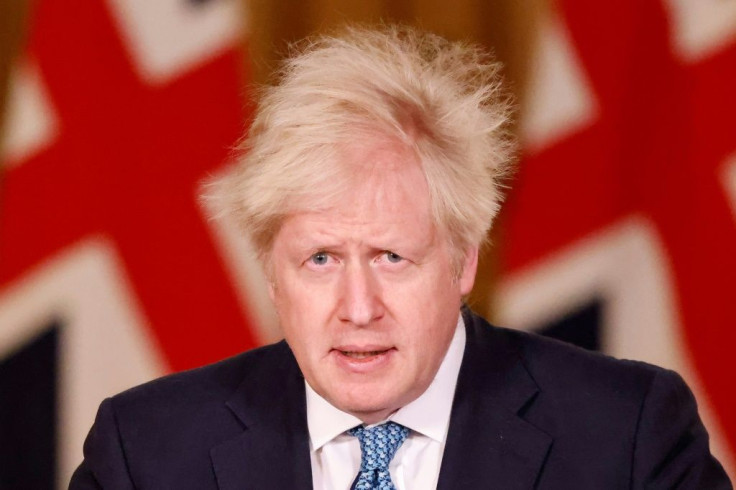Boris Johnson: From Brexit Hero To 'Vacuum Of Integrity'
Boris Johnson has faced unprecedented pressure from Brexit and the coronavirus outbreak since he became British prime minister in 2019. But he is again under scrutiny about revelations of lavish spending on his official apartment.
Questions about who paid for the Downing Street refurbishment have focused opposition attacks on the Conservative prime minister's long history of mendacity, and his casual approach to ethics in public and private life.
While Johnson looks to political heroes such as Winston Churchill, portraying himself as a man of destiny who "got Brexit done", former Conservative attorney general Dominic Grieve described him as a "vacuum of integrity" over the flat revamp.
A colourful ex-journalist, Johnson has a long trail of contentious remarks in print, attacking women, gays, black people and Muslims.
But the electorate has so far given him a pass.
However, his opponents hope "wallpaper-gate" will finally turn voters off heading into local elections on May 6, accusing Johnson of an arrogant disdain while tens of thousands of families grieve loved ones lost to the coronavirus pandemic.
The prime minister is counting instead on his innate optimism resonating with voters, after successively steering Britain through a mass vaccination programme and on to the "sunlit uplands" of future recovery.
And he wants to be known as the leader who ended years of political paralysis and decisively cut Britain's ties to the European Union, even if Brexit continues to provoke economic dislocation.
Late last year, Johnson was in celebratory mood as he fended off a BBC interviewer's insistence that Britain now faces problematic trade-offs in its future relationship with Europe.
Critics had said "you couldn't have free trade with the EU unless you conformed with the EU's laws (and) that that was having your cake and eating it", Johnson said.
"That has turned out not to be true," he added, after agreeing a trade treaty with Brussels. "I want you to see that this is a cakeist treaty."
Alexander Boris de Pfeffel Johnson was born in New York in 1964, and his sister said as a child he wanted to be "world king".
He spent part of his childhood in the EU capital, where his father Stanley worked for the European Commission, and later attended the elite Eton school in England before studying Classics at Oxford University.

In his biography "Boris Johnson: The Gambler", released last October, journalist Tom Bower recounts the serial womanising that put paid to Johnson's two marriages and his relaxed relationship with the truth.
Johnson is believed to have at least six children, including a baby boy with his fiancee Carrie Symonds, 33.
He first worked as a journalist for The Times, where he was sacked for making up a quote, and moved on to become Brussels correspondent for the Daily Telegraph newspaper.
There he made his name by writing "Euro-myths" -- exaggerated claims about the EU such as purported plans to standardise the sizes of condoms and bananas.
Johnson then entered politics but in 2004, he was sacked from the Conservatives' shadow cabinet for lying about an extra-marital affair.
He rallied to become mayor of Labour-voting, staunchly pro-European London in 2008, an achievement commentators put down to his brazen refusal to respect convention.
Johnson felt torn about which way to leap in Britain's 2016 Brexit referendum, famously drawing up a list of pros and cons for EU membership before throwing his political charisma behind the "leave" campaign.
Johnson's popularity, and propensity for exaggeration, helped swing the bitterly divisive campaign, and he intervened in July 2019 to end the subsequent political paralysis by seizing control of the Conservative party from Theresa May.
After winning a thumping election victory in December 2019, he was diagnosed in March last year with Covid-19 and ended up in intensive care, crediting two immigrant nurses with helping to save his life.
The pandemic has claimed the lives of more than 127,400 other Britons, however, and Johnson stands accused of dodging hard choices after a long run of policy U-turns.
But on Brexit, he stuck to a hardline vision.
In 2018, he quit his role as foreign secretary under May over her Brexit plan, which sought to keep Britain in the EU's regulatory orbit as the price of economic stability.
When she resigned after failing three times to get her EU divorce deal through parliament, Johnson took over. Within six months he had renegotiated the deal, won an election and taken Britain out of the EU.
"Those who did not take him seriously were wrong," French President Emmanuel Macron said at the time. But he also accused Brexiteers of indulging in "lies and false promises".
© Copyright AFP 2024. All rights reserved.





















